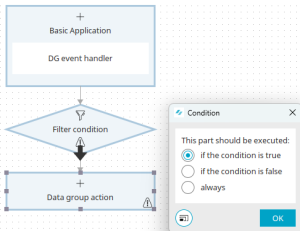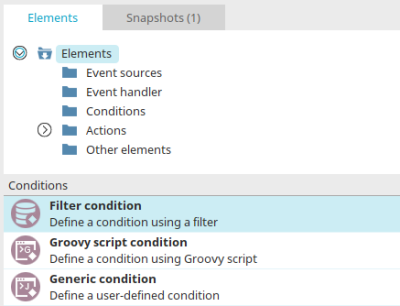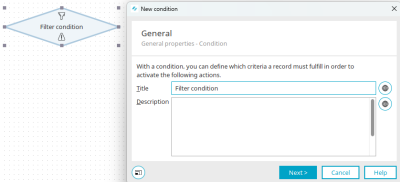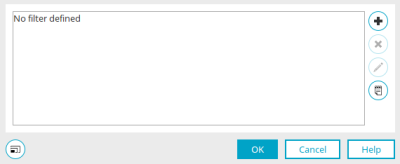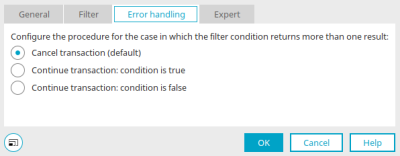Filter condition
A filter condition can be used, for example, to decide which further process steps should be carried out for an investment application if the investment volume is less than €150.
A filter condition can only be configured if a triggering data group is defined in the process chain (e.g. in the data group event handler) to which the filter condition is linked. The output of the filter condition can be linked to other conditions or actions.
can only be configured if a triggering data group is defined in the process chain (e.g. in the data group event handler):
A condition is completely and correctly connected, once a connection is made to both of these elements.
When a filter condition is linked to a subsequent process element, a dialog opens automatically in which you can specify whether the following process step
-
always
-
if the condition is fulfilled
-
if the condition is not fulfilled
is to be executed.
The branch with the "Always" condition is always processed last.
Create filter condition
The filter condition can be found in processes in the "Elements" area. It belongs to the "Conditions" category. From there, it can be dragged and dropped to the desired location on the workspace and then configured. General information on creating process elements can be found here.
Once you have created the filter condition on the workspace, open the properties dialog by double-clicking on the element.
General
Title
Enter a title for the action here.
Description
A short description can be entered here.
![]() Multilingualism
Multilingualism
Opens a dialog in which the title or description can be stored in multiple languages. Further information on this topic can be found here.
Click "Next".
Filter
All information about the settings in this dialog can be found here.
Click "OK" to complete the configuration.
Exception handling
Once the filter condition has been created and configured, you will find the additional "Exception handling" tab when you open the properties dialog again. Here you can configure how the condition should be evaluated if it returns multiple results.
Configure the procedure for the case in which the filter returns more than one result
Cancel transaction (default)
The transaction will not continue.
Continue transaction: condition is fulfilled
The transaction is continued if the condition is met.
Continue transaction: Condition is not fulfilled
Continue transaction: condition is false
In situations where multiple results are entirely correct, such as when testing for the presence of child records (child data group FKLID = parent data record LID), continuing the transaction can be wanted. In this case, you have the additional option to decide whether the condition should be treated as fulfilled or not fulfilled.
More information
Create and manage processes
